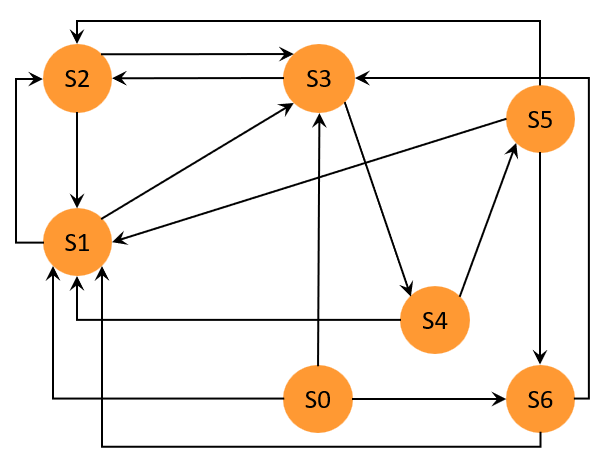1.4 Finding Hamiltonian Path
In previous Section, we learned some of the path operators and path conditions. With a combination of path operators and compound path conditions, we are able to solve many interesting problems from graph theory. For example, Hamiltonian path problem from Introduction . In this Section, we will show you how to write a Cyclone specification to solve this problem.
The graph from Chapter 0 is shown below:

Remember the condition for finding a Hamiltonian path is that:
covers all the nodes of a graph exactly once
Since the condition says that first we need to cover all the nodes, we know we have a total of 7 nodes ( S0 - S6 ) in our graph. Therefore, a valid Hamiltonian path for this graph must have a length of 6 . The length of a path is defined by the number of edges.
Next, we need to cover each of node exactly once. We can easily use ^{i..j} path operator to construct a path condition for each node. Finally, we do not know which node this path will reach, but what we know is it eventually will reach any of these 7 nodes (except for our starting node). So we can specify these nodes in our reach statement.
Say we define node S0 as a starting point. Hence, we now can define our goal of finding Hamiltonian path for the graph above as follows:
check for 6 condition (
S0^{1} && S1^{1} &&
S2^{1} && S3^{1} &&
S4^{1} && S5^{1} &&
S6^{1} )
reach (S0,S1,S2,S3,S4,S5,S6)
The full specification for this problem is shown below:
graph HamiltonianPathExample {
// define starting node S0.
abstract start node S0 {}
abstract node S1 {}
abstract node S2 {}
abstract node S3 {}
abstract node S4 {}
abstract node S5 {}
abstract node S6 {}
edge t1 { S0 -> S1 }
edge t2 { S0 -> S3 }
edge t3 { S0 -> S6 }
edge t4 { S1 -> S2 }
edge t5 { S1 -> S3 }
edge t6 { S2 -> S3 }
edge t7 { S2 -> S1 }
edge t8 { S3 -> S2 }
edge t9 { S3 -> S4 }
edge t10 { S4 -> S5 }
edge t11 { S4 -> S1 }
edge t12 { S5 -> S1 }
edge t13 { S5 -> S1 }
edge t14 { S5 -> S6 }
edge t15 { S6 -> S1 }
edge t16 { S6 -> S3 }
/*
* Goal: Find a Hamiltonian Path, starting from node S0.
*/
goal{
check for 6 condition (
S0^{1} && S1^{1} &&
S2^{1} && S3^{1} &&
S4^{1} && S5^{1} &&
S6^{1} )
reach (S0,S1,S2,S3,S4,S5,S6)
}
}
Compile this specification, and Cyclone successfully finds a Hamiltonian path for this graph:
S0->S6->S3->S4->S5->S2->S1
1.4.1 Practice.
Can you use Cyclone to find all possible Hamiltonian paths in this graph?
Can you use Cyclone to find all possible Hamiltonian cycles in this graph?
A Hamiltonian cycle is a Hamiltonian path that starts and ends with the same node.
Execution Result
Press 'run' to execute the code and see checking results.
Execution server didn't supply any information
URL: /server